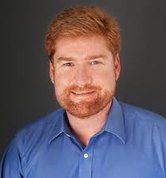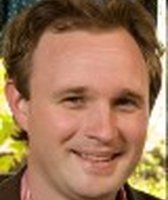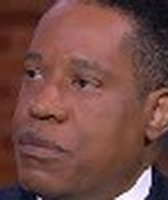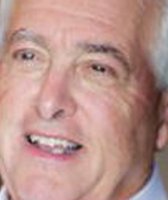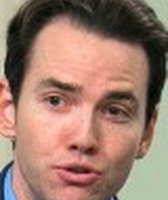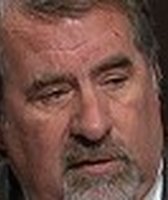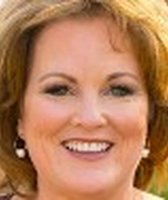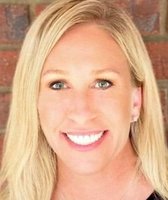Stand up for the facts!
Our only agenda is to publish the truth so you can be an informed participant in democracy.
We need your help.
I would like to contribute
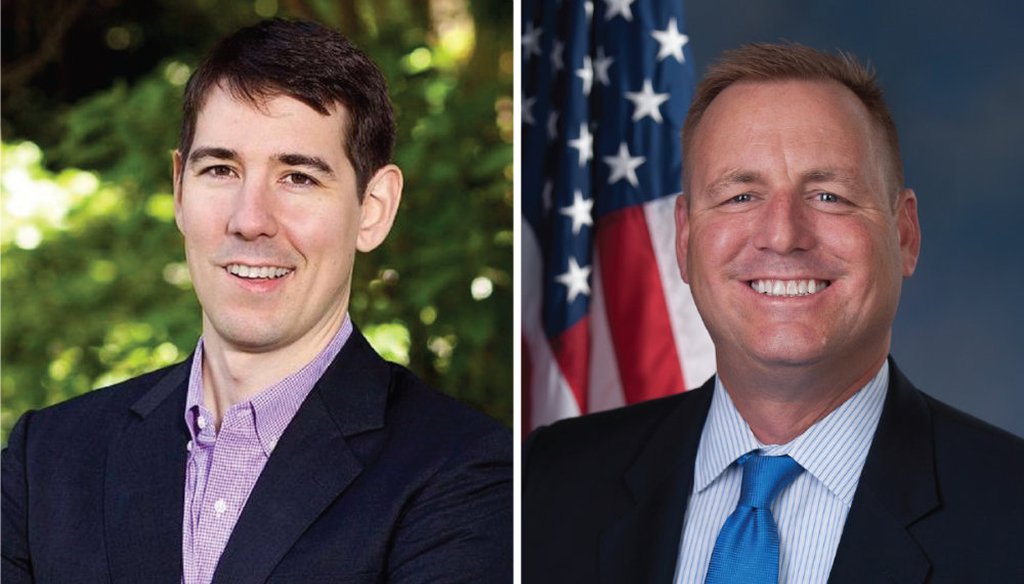
Democrat Josh Harder (left) is running for California's 10th Congressional District against incumbent Republican Rep. Jeff Denham in one of the state's most competitive campaigns.
In a high-stakes Congressional race in California’s Central Valley, Republicans are spending millions of dollars on TV attack ads to paint Democrat Josh Harder as a Bay Area elitist as he challenges GOP incumbent Rep. Jeff Denham.
They’ve called Harder, who was born and attended high school in the the 10th Congressional District near Modesto, "A Pelosi liberal," and a "San Francisco venture capitalist," who "isn’t like us."
On social media, the jabs about whose Central Valley roots run deeper are made with the hashtag #BayAreaHarder.

 Democratic candidate for Congress Josh Harder has responded to criticism that he’s a Bay Area elitist by producing TV ads showing him talking with farmers in his hometown Central Valley district.
Democratic candidate for Congress Josh Harder has responded to criticism that he’s a Bay Area elitist by producing TV ads showing him talking with farmers in his hometown Central Valley district.
Sign up for PolitiFact texts
Harder, 32, moved back to the district last year after earning degrees at Stanford and Harvard and later working for venture capital firms in Boston and San Francisco. He’s a fifth generation Valley resident and now teaches business at Modesto Junior College.
In response to the criticism, Harder and his supporters have pointed out that Denham, 51, hasn’t lived his whole life in the agricultural district, either. In fact, the congressman grew up in Los Angeles County, served in the U.S. Air Force and started his career on the Central Coast. And despite calling himself a "local farmer" on the November ballot, Denham no longer personally farms the land he owns south of the district, in Atwater. He maintains a residence in the district in Turlock, but moved his family to live with him in Northern Virginia after he was first elected to Congress in 2010.
"I made the decision that's best for my family," Denham told McClatchy DC in a February 2012 news article.
This closely watched midterm campaign is one of a half dozen toss-ups in California that could help determine control of the House. Given its significance, PolitiFact California decided to examine the ads and candidates’ biographies and explore how much, or how little, they could influence voters.
‘Not like us’
The 10th Congressional district is about 90 minutes east of the San Francisco Bay Area. It includes portions of Stanislaus and San Joaquin counties and the cities of Modesto, Oakdale, Manteca, Tracy and Turlock.
Residents in the district say they are worried about the growing cost of tariffs on farmers, along with healthcare expenses and ensuring there’s adequate water supply.
And if they watch TV, they’re being fed a steady diet of attack ads on both Harder and Denham. We examined one by the Congressional Leadership Fund, a Super PAC dedicated to protecting the Republican majority in the House.
It’s titled ‘Shady Josh Harder’:
"San Francisco venture capitalist Josh Harder isn’t like us. Harder got rich by investing millions in a health care company that jacked up rates on consumers. What’s worse? Another company Harder’s firm invested in was fined over $100 million for false advertising and failing to protect consumer information like social security numbers, credit cards and bank accounts. With Shady Josh Harder, it’s always less for you and more for Josh."
This ad above is by the Congressional Leadership Fund, a Super PAC aligned with Republicans.
The ad flashes a reference to a Denver Post news article from July 14, 2017 to support its claim Harder "got rich by investing millions in a healthcare company that jacked up rates on consumers." The article describes health insurance premiums going up in Colorado’s individual health market.
But in it, Colorado Insurance Commissioner Marguerite Salazar attributes the rise to the uncertainty over what the Trump Administration would do on healthcare.
"I believe that the dubious situation at the federal level has contributed to the premium increase requests we’ve seen from the companies," Salazar said in the article.
In a recent press release, Denham’s campaign said Harder’s work on the investment team at Bessemer Venture Partners demonstrates his role in the rising rates. It says Bessemer invested in Bright Health, which offered insurance plans in Colorado. The Post article reported Bright Health raised rates 15 percent, though Denham’s campaign pointed to a document showing a final rate increase of 30.7 percent.
Representatives for the Super PAC pointed to the same document.
They also cited Harder’s candidate financial disclosure report which shows he made $198,000 from Bessemer in 2017, where he served as vice president and was based in San Francisco. That income, however, would not necessarily be tied to a single investment the firm made and doesn’t show Harder "got rich" off this one deal.
Harder’s team at Bessemer worked on a portfolio of investments, including with technology, insurance and marketing start-ups, according to a news release outlining his responsibilities at the company.
When asked about the ad, Harder’s campaign did not respond to questions about that specific claim. It provided a written statement attributed to Harder saying:
"The Congressional Leadership Fund is a Republican super PAC known for intentionally misleading voters. The real reason healthcare premiums are rising is because of Republican sabotage of the healthcare markets. They are trying to distract from the real issue here: Jeff Denham’s terrible record on healthcare."
‘These ads don’t resonate here’
We also asked residents and political observers in the district how much influence the ads might have on voters.
Mike Dunbar, opinions page editor for The Modesto Bee, said he doubts they’ll make a difference.
"These ads, I just don’t think they resonate here," Dunbar told PolitiFact California. "Josh Harder was raised around here. He went to Modesto High School. He went off to Stanford. Oh, is that a terrible thing? No, not really. Most parents aspire for their kids to go to places like Stanford or Berkeley."
The paper’s editorial board has endorsed Harder. It endorsed Denham in five of his past elections, though not in 2016.
Denham’s healthcare vote
Harder has gone after Denham in TV spots, especially for his vote last year to repeal the Affordable Care Act, or Obamacare. Republicans in the House approved its repeal and fell one vote short in the Senate.
We examined this claim in one of Harder’s ads in which he says:
"When our congressman Jeff Denham voted to take health insurance away from 100,000 people in this district and eliminate protections for preexisting conditions like my brother's, it's not just wrong, it's personal."
The ad above is by Josh Harder for Congress.
We focused on whether the vote would have "eliminated protections for preexisting conditions."
Obamacare prohibits insurers from denying coverage to people with pre-existing conditions. PolitiFact National has fact-checked claims about how its repeal, if it had been successful, would have affected coverage. It found the GOP’s American Health Care Act "would have kept the requirement that people with pre-existing conditions must be offered health insurance – but it would have dropped Obamacare’s rules capping how much extra those people could be charged."
"In short, insurers would have been required to offer everyone a plan, but insurers would have more control over how much they could charge," PolitiFact reported. "Experts say that would have effectively priced many people living with pre-existing conditions out of the insurance market."
Harder’s ad is generally correct on this point about pre-existing conditions, given the possible loss of coverage.
Ads effective in a close race?
Stephen Routh, a political science professor at Cal State Stanislaus in Turlock, believes some of the negative Super PAC ads could help Denham.
"If it’s a really close race, they can make a difference," Routh said. "Being able to frame the discourse in a manner that paints Harder as a pseudo carpetbagger -- ‘He’s not one of us’ -- that can be effective."
But will it be?
Margaret Olson, a retired Modesto police records supervisor, who describes herself as "basically a Democrat," said she’s more interested in issues such as the Valley’s groundwater depletion than where a candidate started his career.
"To tell you the absolute truth," Olson said outside the county library in Modesto, "I don’t really care if you’re from here or not, as long as you know the issues that affect us here and you’re willing to do something about them."
Paul Mitchell, a polling expert who runs Political Data, Inc., said many new voters attracted to the race likely won’t look at the candidates’ personalities or the details of their positions on key issues. Instead, "they are deciding based on what that candidate means in the national sense, as a referendum on Trump and Congress," Mitchell said in an email.
"These districts are being nationalized," Mitchell told Capital Public Radio in August. "It is becoming less and less every day about individual candidates and their styles or personalities. And more and more about is my vote going to change the majority of the U.S. Congress."
Roni Edgmon, a retired Modesto school teacher, said she’s aware of the hyper-partisanship. But, she said, she’ll cast her vote for Denham based on his support for the Valley’s ag industry, and not to keep the Republican majority.
"It doesn’t factor into my decision making. I vote for who is honestly supporting the issues that I think are so important," Edgmon said outside Modesto’s Gallo Center for the Arts. "And I think it’s got to be about America and about Modesto and our community and not just the party."
Voters in the district, influenced by the campaign ads and national politics or not, will have their say on Election Day, Nov. 6.
Our Sources
Congressional Leadership Fund, campaign ad, ‘Shady Josh Harder,’ accessed October 2018
Josh Harder for Congress, campaign ad, ‘Harder Personal,’ accessed October 2018
Mike Dunbar, opinions page editor of The Modesto Bee and Merced Sun-Star, phone interview, Oct. 17, 2018
Stephen Routh, political science professor, Cal State Stanislaus at Turlock, phone interview, Oct. 17, 2018
Paul Mitchell, vice president, Political Data, Inc., email exchange Oct. 23, 2018 and Capital Public Radio podcast interview Aug. 17, 2018
Roni Edgmon, retired Modesto school teacher, interview, Oct. 15, 2018
Margaret Olson, retired Modesto police records supervisor, interview, Oct. 15, 2018
Josh Whitfield, spokesman, Jeff Denham for Congress, email exchange Oct. 23, 2018
Nicole Nabulsi, spokeswoman, Josh Harder for Congress, email exchange Oct. 23, 2016
Courtney Alexander, spokeswoman, Congressional Leadership Fund, email exchange Oct. 24, 2018
McClatchy DC Bureau, Lawmakers' homes: Location, location, politicization, Feb. 3, 2012
The Modesto Bee, Denham wins in court, will be called ‘farmer’ on November ballot, Aug. 30, 2018
The Denver Post, Colorado health insurers seek 27 percent premium increase in individual market, July 14, 2017
Jeff Denham for Congress, press release: JOSH HARDER’S RECORD ON HEALTH CARE, Sept. 22, 2018
Josh Harder, candidate financial disclosure report, May 15, 2018
Colorado Department Of Regulatory Agencies, Final Rate Change for Bright Health for 2018 Individual Market, Accessed October 2018
PR Newswire, Bessemer Venture Partners Promotes Josh Harder to Vice President, Sept. 21, 2016
